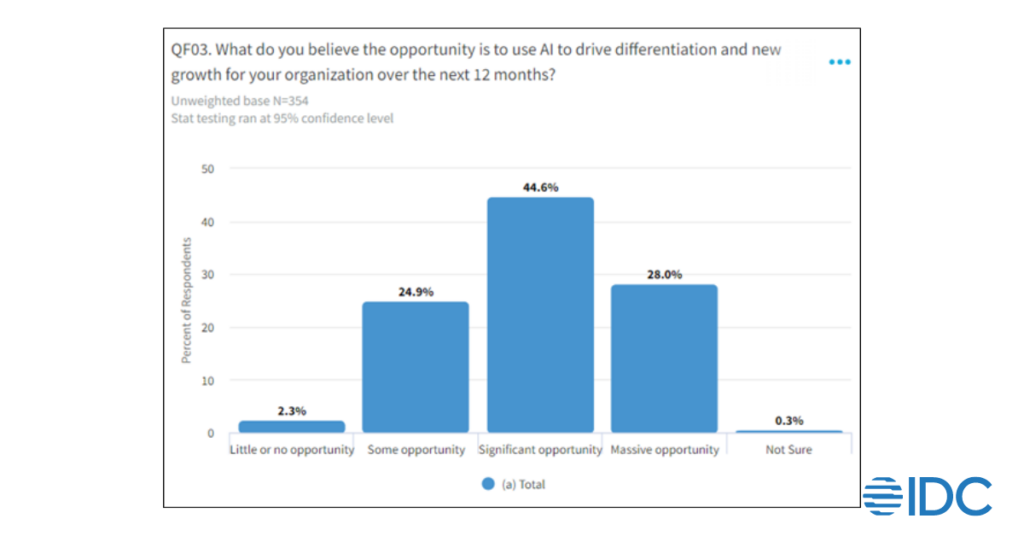Looking back at the IDC FutureScape: Worldwide CIO Agenda 2024 Predictions – Implications for Asia/Pacific (excluding Japan) that I co-wrote, and given the continued acceleration of technological evolution that are presenting opportunities for organizations, I find myself asking the question – if I were a CIO, what would I have done by now and what should I do next?
Foster Culture, Support People, Embrace Innovation
As tech leaders, CIOs are instrumental in leading people through change. If I am a CIO, I will cultivate my employee’s people skills to complement their technical expertise. Effective communication, empathy, and collaboration are now more important than ever in fostering a positive work culture. Technology may be the tool, but people are the heart and soul of any organization.
Three months into 2024, I would have by now established strategic alignments with my team and peers, leading a mindset shift to ensure we do not just talk about changes but have concrete plans for implementing changes.
I will also continue to increase the technology skills of my employees, particularly around AI. In IDC’s CEO Survey 2024, 60% of CEOs think their organizations do not have the necessary advanced technological skillsets key to having an AI roadmap. Additionally, when asked about the most critical success for CEOs, people leadership and change management capabilities is top of the agenda with close to 40% saying so in the poll results.
My next key step will be to define, invest in, and rollout training and development programs that focus on upskilling or reskilling. Continuous innovation will be at the top of my organization’s strategy. Dedicated innovation teams or initiatives within the organization will be created to explore new technologies and experiment with different approaches.
AI, being one of the most transformative technologies to come along in a long time, will be carefully considered and planned alongside key stakeholders validating key use cases. The approach needs measurable outcome of the benefits around AI, given the fact that it makes some people excited, others fearful, and a handful of others uncertain and skeptical. This is especially so when they think about what AI means for them and their job security.
By 2028, 80% of CIOs will leverage organizational changes to harness AI, automation, and analytics, driving agile, insight-driven digital businesses.
When CEO’s were asked, IDC’s 2024 CEO Survey resonate with this and state that 75% of them agreed that AI will be key to drive differentiation and growth for their organization over the next 12 months.

With the constantly emerging trends on AI, cybersecurity, and digital transformation, there is even greater need to inspire my team to understand and embrace these to drive positive changes. As CIO, my role is to ensure continuous innovation and alignment with corporate strategy.
Digital First Capabilities – Automation / Artificial Intelligence / GenAI
Inevitably, by now as a CIO, I would have already considered automation in one form or another to simplify and automate repetitive tasks. I will question our automation initiatives and strategies to effectively plan our direction.
Unlike other organizations that have GenAI in their roadmap or plans, for me, GenAI is not just another tech buzzword. I will lead my organization’s GenAI initiatives with specific desired outcomes to meet business goals in mind. I will be aware that GenAI use cases are predominantly unique to different organizations across industries and that in its early stages, these will present both opportunities and risks if not managed ethically.
According to IDC’s Future Enterprise and Resiliency Spending (FERS) Survey, only a third of enterprises are investing significantly in GenAI and another third are very much in a piloting phase.
As a CIO, I would review plans on automation and GenAI technologies against relevant use cases and explore pilot projects early, to test their potential impact and value to the organization. I will bear in mind that it is key to start small and iterate quickly, scale it up when confidence in our capabilities is gained. I will leverage our partnership with our solution provider to help to guide and shape our AI roadmap quickly in its early stages.
Double Down on Data-Driven Decision Making
It was once said that data is the new oil and I think that is still largely true. Like oil, data needs to be refined, processed, and analyzed to unlock its full potential. Those who can harness it effectively will stand to gain significant advantages in their targeted industries.
The rise of GenAI has taught us that the supremacy of data will generate and create differentiated value. An organization’s capability to leverage these advantages will allow them to leapfrog the competition. However, concerns about data privacy and security remain key topics around the collection and utilization of data.
In IDC’s CIO Poll 2024, at least 40% of organizations do not plan to disclose the data they will use to train their AI models. This means there will be much-needed investment in skills and analytics tools to harness the power data, enabling the organization to extract actionable insights.
Similarly, use cases are critical in prioritizing data and data models. But, to establish enterprise scale, a solid governance foundation will be required to significantly influence external provider/partner decisions.
As CIO, I will make sure to build the necessary infrastructure, network, and relevant technologies and capabilities around AI. This means implementing a robust data analytics strategy and exploring key considerations for an AI-ready infrastructure for both public and private AI.
Continuous Driving in the Co-Pilot Seat
While digital transformation remains a top priority for organizations seeking to stay competitive in today’s digital economy, as CIO it’s important that I master the conversation around AI as it has evolved into a necessity in 2024 and beyond. Cultivating people skills, empathy, communication, collaboration, and partnerships will no longer be just nice to haves but essentials in building stronger teams that will ensure business success.




